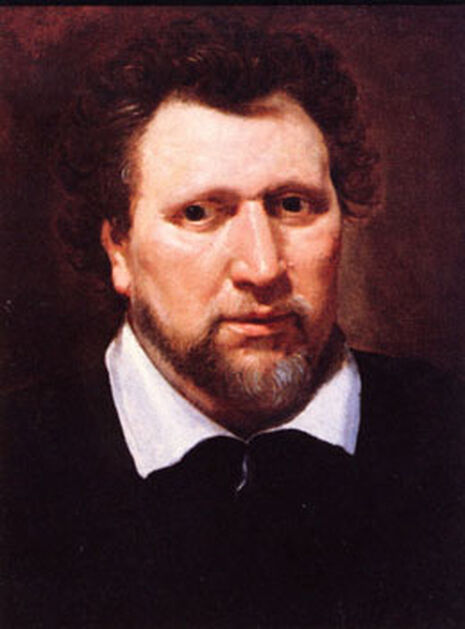Poetry the Seducer: “Let’s do it, let’s fall in love”
Katy Perry takes on John Donne as John Swarbrooke considers the enduring power of poetry to make the beloved go weak at the knees

For better or for worse, people have always turned to poetry to express their love for one another. ‘Let us live [...] let us love’ wrote Catullus in the first century BC. A quick search for love poems on Google today returns 66,700,000 results. So what is it about this medium which makes it so enduringly popular? Surely poetry can never equal the effect of sexy glances across the dancefloor or unforgettable conversations which go on into the early hours? In our post-Valentine's-card age where roses are always red and violets always blue, can poetry still express raw, exciting, enticing emotions which win the heart of another?
Poetry’s seductive power was certainly something which interested the renaissance writer George Gascoigne. His novel about an attempt to seduce with poetry came out in the 1570s, as the craze for expressing courtly love in lyrics swept across Elizabethan England. The Adventures of Master F.J. follows the eponymous character as he bombards Elinor, the object of his affections, with complimentary verses, only for her to frustrate his advances and ultimately reject him. Defiant, Master F.J. declares that the ‘Sea hath fish for every man’. Was this the beginning of those crushing words of consolation: plenty of fish in the sea?

Even when poetry does succeed in seducing, however, the game is far from won. After procalaiming the ideals of eternal love and flawless beauty, the poet can struggle to live up to those ideals. Ben Jonson was all too aware of this fact: in the poem ‘My Picture Left in Scotland’ he laments that, for all the seductive power of his verse, love is, above all else, about physical attraction. ‘I now think Love is deaf rather than blind’ he declares, before explaining his fear that she may have seen ‘My mountain belly and my rocky face.’ If online daters take liberties with the truth, so do poets - but somehow it's a lot less creepy.
And then, of course, there are those who never sought ideals in the first place, making us reassess the meaning of love. For the Metaphysical poets, notably John Donne and Andrew Marvell, the struggle between the ideal and the physical tips all too often in favour of the temptations of the body. ‘Thy willing soul transpires / At every pore with instant fires’ Marvell tells his coy mistress. As ‘Time’s wingèd chariot’ approaches, bringing with it the decline of old age, the best thing to do, Marvell argues, is to seize upon the present moment ‘like amorous birds of prey’.
At first, we are taken in by the sheer beauty of Marvell’s verses as they brush over us like the gentle caresses of the lover, while the beating away of the rhythm reminds us of the deathly tick-tock of time. But then, all of a sudden, we sit up. We realise that we are being taken in. Behind the rhetorical power of this love poem -- one of the most canonical love poems in the English language -- are, quite simply, two incredibly libidinous men bent on seduction. Less love, more lust - and lots of it.

Today, the spirit of seduction exists most prominently in song lyrics. Divided between expressing emotion and satisfying lust, the most popular contemporary love songs are sentimental and sexual in equal measure. While Taylor Swift depicts someone she loves as a ‘little taste of heaven’ in ‘Untouchable’, calling on him to reciprocate her love, Katy Perry takes matters into her own hands, telling her lover that they will ‘go all the way tonight/No regrets, just love’ in ‘Teenage Dream’. Like Marvell, love becomes part of the struggle against time for Perry- ‘You and I, we’ll be young forever’ she sings - and ‘the fort of sheets’ which she describes building in a motel could be easily be an image straightout of Donne’s ‘To His Mistress Going to Bed’, where the poet describes ‘love’s hallowed temple, this soft bed’. I never thought I would find myself comparing Perry and the Metaphysical poets, but both seem to achieve the combination of idealism and realism which makes their lyrics powerfully and disarmingly seductive. There, I said it.
Anyway, if you are currently suffering from writer’s block as you attempt to pen your own seductive sonnet, song or haiku, seek consolation and perhaps a relieving discouragement in these words from Walter Ralegh’s poem The Silent Lover (the clue’s in the name). All things considered, perhaps we do say it best when we say nothing at all:
They that are rich in words, in words discover
That they are poor in that which makes a lover.
 News / Clare Hall spent over £500k opposing busway 24 December 2025
News / Clare Hall spent over £500k opposing busway 24 December 2025 Comment / The ‘class’ of Cambridge24 December 2025
Comment / The ‘class’ of Cambridge24 December 2025 News / Caius mourns its tree-mendous loss23 December 2025
News / Caius mourns its tree-mendous loss23 December 2025 Comment / Yes, I’m brown – but I have more important things to say22 December 2025
Comment / Yes, I’m brown – but I have more important things to say22 December 2025 News / Girton JCR publishes open letter expressing solidarity with Palestine25 December 2025
News / Girton JCR publishes open letter expressing solidarity with Palestine25 December 2025









